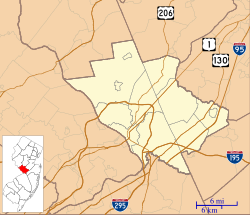Trenton Battle Monument
|
Trenton Battle Monument
|
|
 |
|
| Location | Trenton, New Jersey |
|---|---|
| Coordinates | 40°13′33″N 74°45′53″W / 40.22583°N 74.76472°WCoordinates: 40°13′33″N 74°45′53″W / 40.22583°N 74.76472°W |
| Built | 1891–93 |
| Architect | John H. Duncan |
| Architectural style |
Beaux Arts Sculptors: William Rudolf O'Donovan Thomas Eakins Charles Henry Niehaus |
| NRHP Reference # | 77000881 |
| NJRHP # | 1800 |
| Significant dates | |
| Added to NRHP | May 6, 1977 |
| Designated NJRHP | October 14, 1976 |
The Trenton Battle Monument is a massive column-type structure in the Battle Monument section of Trenton, Mercer County, New Jersey, United States. It commemorates the December 26, 1776 Battle of Trenton, a pivotal victory for the Continental forces during the American Revolutionary War.
Designed by John H. Duncan, the architect of Grant's Tomb, the monument is an early example of Beaux-Arts architecture in America. The design is based on "The Monument", a 1671 structure built to commemorate the Great Fire of London, on the London street where the 1666 fire started. The height of the Trenton monument is intentionally the same height as the London monument.
The hollow Roman-Doric fluted column of the monument is constructed of granite, as is the pedestal which supports it, although slightly darker stone was used to give the base the appearance of more solidity. The column is capped by a small, round pavilion, forming an observation deck; accessible by means of an electric elevator, that has provided thousands of tourists an excellent view of the city and the surrounding scene of the battle. Encircling the column, just above the cap, thirteen electric lights, symbolizing the original Thirteen Colonies, shed their radiance at night.
The pavilion is surmounted by an acanthus leaf pedestal where, atop the entire structure, a colossal bronze statue of General George Washington by William Rudolf O'Donovan crowns the monument. Washington is depicted as he appeared at the opening of the engagement and, with his extended right hand, directs the fire of the Continental artillery down King (now Warren) Street. The figure is 13 feet (4.0 m) feet tall, while the monument, including the statue, is 150 feet (46 m) above street level.
...
Wikipedia



